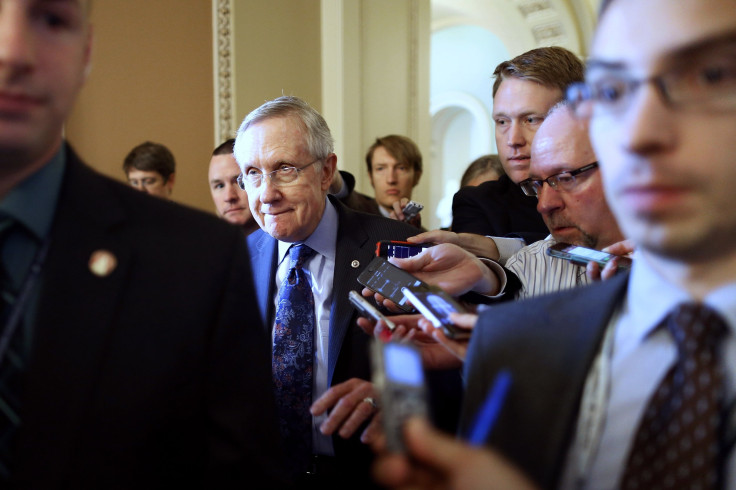Debt Ceiling 2013: Deal Reached To End Government Shutdown, Avert Default

Senate leaders promised a deal, and they have delivered. Agreeing almost at the last minute, Majority Leader Harry Reid, D-Nev., and Minority Leader Mitch McConnell, R-Ky., struck a deal Wednesday to end the government shutdown and avert a default on the U.S. debt.
Focused talks began over the weekend amid clouds of uncertainty after President Barack Obama refused a proposal last week from House Republicans to temporarily increase the $16.7 trillion debt limit by the Oct. 17 deadline. That's when the U.S. Treasury's borrowing authority would have been exhausted, leaving it with about $30 billion cash on hand to pay the bills.
“The compromise we reached will provide our economy with the stability it desperately needs,” Reid said. “We have sent a message to Americans from every state and citizens of every country that the United States lives up to its obligations. Now Congress must return to its most important job -- fostering economic growth and protecting middle-class families.”
“This has been a long, challenging few weeks for Congress and for the country,” McConnell also said on the floor. “It’s my hope that today we can put some of the most urgent issues behind us.”
Under the deal brokered, the government will reopen until mid-January, the debt limit will be lifted until early February, budget negotiations between the House and Senate have been set up to tackle more long-term fiscal solutions and verification provisions for beneficiaries of Obamacare subsidies will be strengthened. Lawmakers now have time to hash out a more formal budget deal, but will probably face another grueling debt limit fight next year -- an election year.
The White House said Obama applauds the two leaders for working together on the compromise. However, White House Press Secreatry Jay Carney said no official statement will be released until the measure moves through both chambers.
“[The president] looks forward to Congress acting so he can sign legislation opening the government and removing this threat from the economy," Carney said at a press conference. “We hope each house will be able to act swiftly.”
It is uncertain when the bill will be voted on on the Senate floor.
Still, the fiscal fiasco is far from over. Once passed by the Senate, the Reid-McConnell compromise will head to the House of Representatives where Speaker John Boehner, R-Ohio, will be tasked to bring it to the floor in time.
Boehner's spokesman Michael Steele told Politico that “No decision has been made about how or when a potential Senate agreement could be voted on in the House.”
It was a grueling fight to get there and Republicans have been left with battle wounds. Polls have shown that only 24 percent of Americans hold a favorable opinion of the GOP and an even lower 21 percent approve of the tea party. The Republican strategy in the budget battles was also largely rebuked by the public, with 74 percent of voters disapproving of congressional Republicans, according to Quinnipiac University, and only 17 percent approving. It was the lowest score on record in that poll for the party.
A tea party push that began with Sen. Ted Cruz, R-Texas, to include legislation to defund or delay Obamacare into the funding and debt limit bills quickly transformed into the first government shutdown in 17 years, and endangered the U.S. credit rating, as lawmakers came perilously close to the default deadline. More than 800,000 federal workers deemed non-essential were sent home without pay while non-controversial agencies such as the national parks and other attractions were forced to shutter.
“I have no objection to the timing of this vote,” Cruz said, adding that the vote could likely happen today. “The reason is simple: There is nothing to be gained from delaying this vote one day or two days. The outcome will be the same -- every senator, every member of the House is going to have to make a decision where he or she stands. ... I’ve never had any intention of delaying the timing of this vote.”
The tea party Republican also said the Senate deal provides no relief for Americans who are hurting because of Obamacare.
© Copyright IBTimes 2024. All rights reserved.












